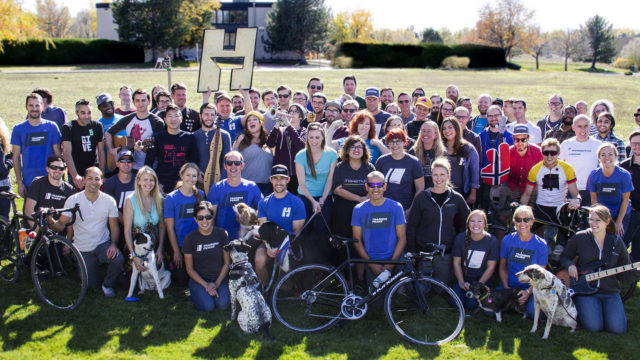A group of CU students recently invested $25,000 in Denver-based small-home builder startup Simple Homes.
As members of CU’s Deming Center Venture Fund, one of the nation’s oldest running student-run venture funds started 20 years ago, they exemplify one way CU’s entrepreneur ecosystem amplifies the Front Range tech scene.
With Boulder’s national reputation as a tech hub, thought incubator, and a long-time college town, the city enjoys a cross-pollination of innovation, which drives the city’s tech pulse forward and sharpens its competitive advantage.
Boulder’s entrepreneurial ecosystem started to accelerate in the early nineties with the launch of StorageTek, a data storage technology company founded by four former IBM engineers, which led to dozens of spin-off companies, says Erick Mueller, the executive director of CU’s Deming Center who has also taught entrepreneurship at the university for 15 years.

StorageTek began recruiting many of CU’s MBAs, which resulted in the building of partnerships with local companies, doing student internships as well as student-run projects, and having speakers from the community come in to do lectures.
Then, in 2006-2007, the Boulder Denver New Tech Meetup, the largest community run organization in the state, began meeting on CU’s campus led by its founder Robert Reich. Each month, between 250 to 300 members from the startup community would connect on campus, with five or so companies each time sharing what they are working on for feedback from the rest.

While the University of Colorado operates as a microcosm within the city — and its population of largely transient students — CU’s roots still spread throughout startups in town.
Part of the powerful influence of Boulder’s startup scene has to do with the conscious effort to overlay conventional pedagogy with community experience, what Brad Bernthal, Associate Professor of Law and Entrepreneurship, calls a “town and gown teaching configuration.”
In 2008, Brad founded the Silicon Flatirons Center’s Entrepreneurship Initiative, designed to facilitate a deep interaction between the University’s campus and the Front Range’s high tech entrepreneurial community.
CU’s entrepreneurship ecosystem
CU’s entrepreneurial ecosystem spans the entire campus starting from its Deming Center for Entrepreneurship, a branch of CU’s Leeds School of Business, and echoing through its Venture Partners program, its New Venture Challenge, its entrepreneurial mentorship program in COventure Forward, its student-run Deming Center Venture Fund, and a slew of other tangent programs including entrepreneurship programs in schools like Architecture and even Music.
The Deming Center, one of Leeds’s four centers which also include the Real Estate Center, Finance Center, and Center for Social Responsibility, teaches over 5,000 credit hours a year of entrepreneurship courses.
In fact, CU Boulder became the first university in the world to offer a Ph.D. in entrepreneurship. This represented a key element to the ecosystem in trailblazing entrepreneurial teaching and research for Boulder.
“The pursuit of entrepreneurship is that we can all learn how to create value from nothing,” Erick says. “The myth was that ‘you’re just born with it; you can’t teach it.’ We’ve dispelled that myth. You can absolutely learn it.”
Students x New Ventures
In approximately 2007, Brad, along with two others, helped co-found CU’s New Venture Challenge (NVC), which became the glue for CU’s entrepreneurial ecosystem.
Two growing startups — influencer marketing service Magneta and innovative parking-space-finder app Drivewayz — were past finalists at NVC’s pitch competition.

Drivewayz is working to streamline parking options. Image: Drivewayz
Before NVC, if business students had an idea for a startup, they could find business plan competitions that supported them, but infrastructure did not exist in other parts of campus, like engineering, law, arts or sciences. The New Venture Challenge created a platform that allowed anybody on campus — grad students, undergraduates, faculty members — to launch their idea and find funding.
“The goal was to take anyone with a real idea and give them wind in their sails,” says Brad. “What makes it really special is that the program has mentors from the Boulder community who volunteer their time to help startups.”
Currently New Venture Challenge has about 50 active mentors helping bring along the next generation of entrepreneurs.
Other ways that students can leverage community resources is through internships, such as Silicon Flatirons’ Startup Summer program. Through Startup Summer, interns working at startups and emerging companies come together one night a week and build a company of their own. At the end of 10 weeks, they pitch their new ideas back to their employers. Each summer, Brad says up to 40 students participate in the program.
Header Image: Aerial shot of CU Boulder. Image: CU Boulder.







